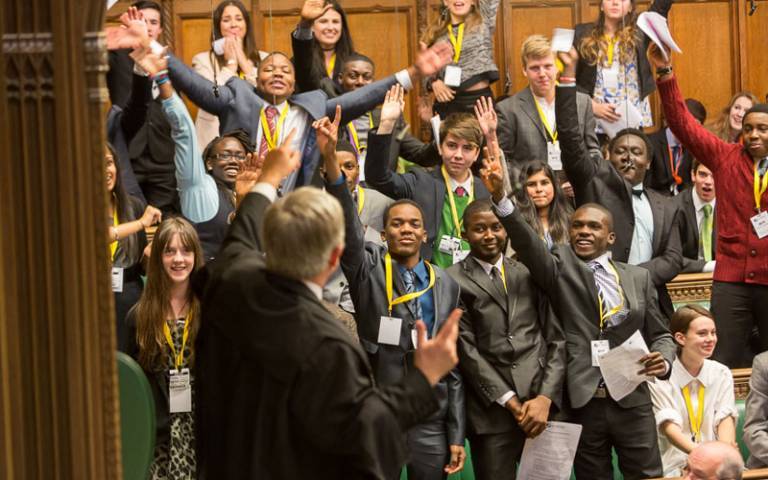The chances of a teenager getting involved in politics is linked to how much education their parents had, according to UCL and University of Roehampton researchers.

Additionally, while parental education has no effect on the political interest of children at age 11 it has a strong positive effect by the time they are 16. As parental education is an important indicator of social background, the growing influence of parental education during adolescence suggests that a social gap in political engagement occurs in this life stage.
The peer-reviewed study, published today in Social Forces and funded by the Nuffield Foundation, analyses data from 1664 participants to assess the impact of family background on young people's political engagement between the ages of 11 and 25. Data was obtained from the British Household Panel Study* and Understanding Society** cohorts.
The researchers explored the effect of socio-economic status, determined by parents' education levels, on levels of political interest and voting intentions.
The study found that in a relatively short space of time parental education develops from an irrelevant factor at the age of 11 to a strong predictor of political engagement and becomes a stable influence by age 16.
Lead author, Professor Jan Germen Janmaat (UCL Institute of Education) said: "We found that at the beginning of adolescence there were no social differences in political engagement, but these differences soon start to appear and to grow wider at ages 14 and 15.
"After age 16, levels of engagement stabilise with young people from more educated families showing consistently higher levels of interest in politics than those from more disadvantaged backgrounds."
Participants were asked questions such as, 'how interested in politics are you?' and 'who would you vote for in an election?'. Mother's and father's education were then ranked on a scale of 1 to 7 and divided into two parental education groups (the top 50% based on the rankings and the bottom 50%).
Political interest was measured on a scale on between 1 and 4, with 4 being the most interested. The findings show that children from the two parental education groups hardly differ in their interest in politics at age 11, with children from less educated families showing a slightly higher level of interest.
Overall, the average scores of the two groups are closer to 1 (not interested) than to 2 (fairly interested) indicating a broad disinterest in politics among 11- to 15-year-olds regardless of background. However, by age 15 there is a clear gap between the groups linked to social background: the political interest of children from the 50% most educated parents had hardly changed, whereas that of the 50% least educated had declined.
By age 25 the level of political interest in the children whose parents were in the more educated group is more than twice as high as those from the group with parents who were in the least educated group.
The study also looked at the development of voting intentions in young people in relation to parental education and political engagement. It found, as with political interest, the gap widened during adolescence between children from the most educated parents and those from the least educated ones.
By age 25 those from the most educated families were almost twice as likely to vote. However, overall levels of voting intention for a political party remain quite low (between 25 and 60 percent) suggesting a continuing disengagement with mainstream UK party politics throughout adolescence and early adulthood.
Professor Janmaat added: "Our findings suggest that early adolescence is the key stage where social disparities emerge. Possibly the impact of parents is indirect in this life phase in that they shape the educational experiences of their children. Such experiences in turn are important drivers of political engagement. For instance, schools offering plenty of opportunities for student voice and an open climate of discussions are known to make young people more engaged.
"If well-educated parents are more likely to send their children to such schools than poorly educated ones, schools can unintentionally amplify the social gap in political engagement."
Bryony Hoskins, Professor of Comparative Social Science at the University of Roehampton and co-author of the study, added: "With voting amongst the UK's youngest cohort in the last general election falling to 47%, these findings highlight the critical influence parental education has on shaping early political interest in our youth.
"Of particular concern is the marked decline in interest from those children whose parents are less educated by the time they are 15 years old, providing vital evidence as to why those from disadvantaged backgrounds are politically disengaged when they can first vote. We would urge the government to review their approach to gather young people's interest in politics in light of our findings."






